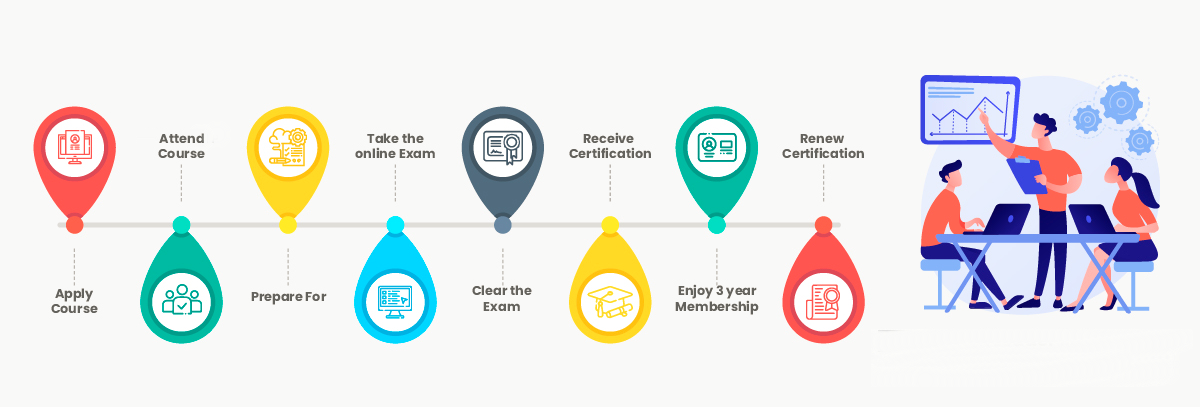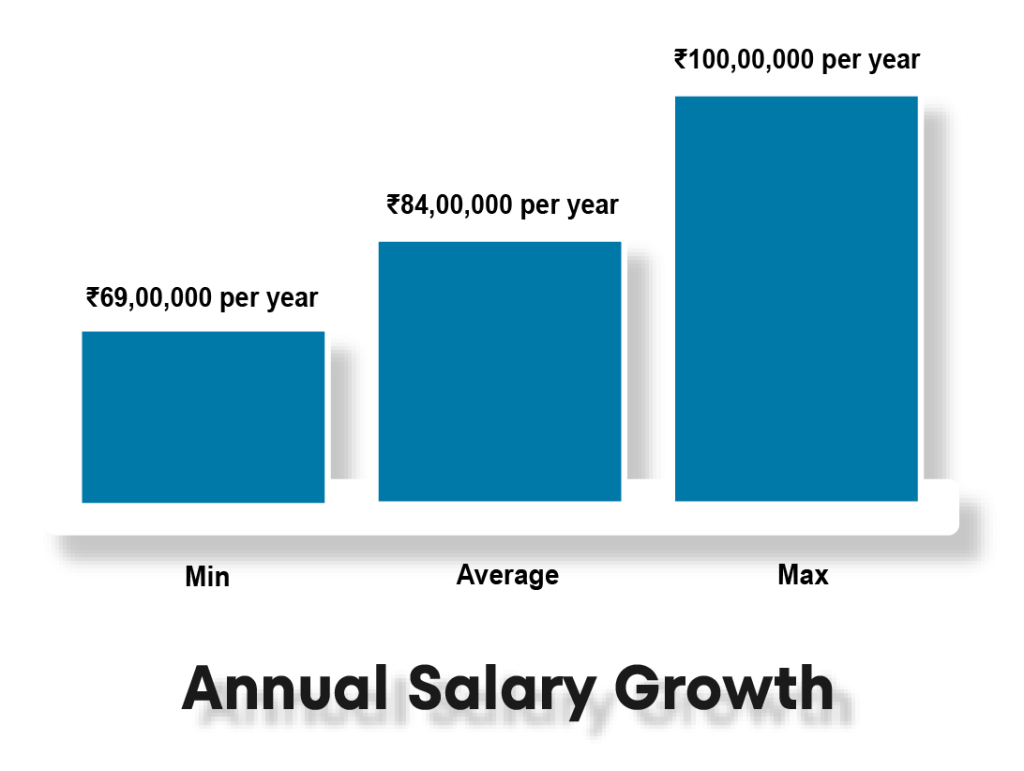
Sambodhi and Education Nest offer a comprehensive Python Analytics training program that focuses on the basics and fundamentals of data analytics with core aspects of Python programming. Python is an ideal programming language for data analytics, and this course is designed to equip learners with the necessary skills and knowledge to excel in the field. The program covers a wide range of opportunities that arise from studying data analytics. Upon completion of the course, learners will have a deep understanding of Python Analytics and will be equipped with the skills and knowledge required to analyze data and extract valuable insights. Enrolling in Education Nest’s Python Analytics training course can help learners take their careers to new heights by gaining expertise in data analytics.
Application Deadline: Jun 30, 2023
Upskill for Your Dream Job
Sambodhi and Education Nest offer a comprehensive Python Analytics Training Course designed to empower individuals with practical skills and in-depth knowledge. With a focus on live project-based training, participants gain hands-on experience in applying Python for analytics purposes. Our esteemed instructors, who possess over 10 years of industry experience, have developed unique teaching styles to facilitate effective learning. Through this course, aspiring candidates will master the essential skills and knowledge required to excel in the field of Python analytics. From data manipulation and visualization to statistical analysis and machine learning, participants will gain a solid foundation in Python for data analytics. Join our course today and unlock the potential of Python analytics for your career advancement.



Instructor-led Python Analytics live online Training Schedule
May 15th – Weekend
July 1st – Weekend
Why enroll for Python Analytics Certificate Training Course?


Demand for Python-skilled data analysts increased by 34% (Indeed) and Python is the top programming language with a 20% demand increase.

Python Analytics skills are sought-after in healthcare, finance, e-commerce, telecom, and technology. Top MNCs like Amazon, Microsoft, IBM, Google, and Facebook hire Python Analytics professionals.

Python analytics salary growth depends on factors like experience, skills, industry, and location. Average salary range in US: $85K-$130K/year. Increasing demand raises salary prospects for Python analytics. .
Python Analytics Training Course Benefits
Enrolling in a Python Analytics course provides several benefits, as it offers a comprehensive overview of data analytics tools and techniques using Python. Python is a crucial skill for many data analytics roles, and learning it can be the key to unlocking a successful career as a data analyst. The Data Analytics with Python course covers the fundamentals of Python programming, data analytics, and data visualization, equipping learners with the skills and knowledge needed to analyze data and extract valuable insights. By enrolling in Education Nest’s Python Analytics training course, learners can develop a highly sought-after skillset that will enable them to succeed in the dynamic and rapidly growing field of data analytics. It is 100% job oriented training Course.

Annual Salary

Hiring Companies
Want to become a Python Analytics Professional?
Why Python Analytics Certificate Training Course from Education Nest






Python Analytics Skills Covered
Python Analytics Training Course Syllabus
• Introduction to Analytics
• Analytics in Python
• Data Analytics Process
• Exploratory Data Analysis (EDA)
• EDA-Quantitative Technique
• EDA – Graphical Technique
• Data Analytics Conclusion or Predictions
• Data Analytics Communication
• Data Types for Plotting
• Getting Started
• Data Structures
• Control Flow and Built-in Functions
• Numpy an External Librar
• Scipy an External Library
• Using Numpy and Scipy
• Using Numpy and Scipy
• Introduction to Statistics
• Statistical and Non-statistical Analysis
• Major Categories of Statistics
• Statistical Analysis Considerations
• Population and Sample
• Statistical Analysis Process
• Data Distribution
• Dispersion
• Histogram
• Correlation and Inferential Statistics
• Anaconda
• Installation of Anaconda Python Distribution
• Data Types with Python
• Basic Operators and Functions
• Introduction to NumPy
• Activity-Sequence it Right
• Creating and Printing an nd array
• Class and Attributes of an array
• Basic Operations
• Copy and Views
• Mathematical Functions of NumPy
• Evaluate the datasets containing GDPs of different countries
• Evaluate the datasets of Summer Olympics 2012
• Introduction to Analytics
• Analytics in Python
• Data Analytics Process
• Exploratory Data Analysis (EDA)
• EDA-Quantitative Technique
• EDA – Graphical Technique
• Data Analytics Conclusion or Predictions
• Data Analytics Communication
• Data Types for Plotting
• Getting Started
• Data Structures
• Control Flow and Built-in Functions
• Numpy an External Librar
• Scipy an External Library
• Using Numpy and Scipy
• Using Numpy and Scipy
• Introduction to Statistics
• Statistical and Non-statistical Analysis
• Major Categories of Statistics
• Statistical Analysis Considerations
• Population and Sample
• Statistical Analysis Process
• Data Distribution
• Dispersion
• Histogram
• Correlation and Inferential Statistics
• Anaconda
• Installation of Anaconda Python Distribution
• Data Types with Python
• Basic Operators and Functions
• Introduction to NumPy
• Activity-Sequence it Right
• Creating and Printing an nd array
• Class and Attributes of an array
• Basic Operations
• Copy and Views
• Mathematical Functions of NumPy
• Evaluate the datasets containing GDPs of different countries
• Evaluate the datasets of Summer Olympics 2012
Python Analytics Training Projects

Python Analytics projects in the retail industry offer tremendous opportunities for extracting valuable insights and driving data-informed decisions. With Python's robust data manipulation and analysis capabilities, retail businesses can effectively analyze customer behavior, optimize pricing strategies, and enhance inventory management. Python can be utilized to perform customer segmentation, predictive analytics, and demand forecasting, enabling retailers to tailor marketing campaigns, identify high-value customers, and make informed inventory replenishment decisions. Additionally, Python's data visualization libraries facilitate the creation of visually compelling dashboards and reports, aiding in the communication of insights to stakeholders. Overall, Python Analytics projects empower retailers to gain a competitive edge by leveraging data-driven strategies and delivering enhanced customer experiences.

Python Analytics projects play a vital role in the IT industry, leveraging the power of data analysis to drive informed decision-making. These projects involve using Python programming and analytics libraries to extract insights, uncover patterns, and make data-driven predictions. In the IT industry, Python Analytics projects encompass a wide range of applications, including network analysis, cybersecurity, data visualization, performance optimization, and predictive analytics. By analyzing large volumes of data, organizations can identify trends, detect anomalies, improve system efficiency, and enhance overall business operations. Python's versatility, extensive libraries, and ease of use make it an ideal choice for developing and implementing analytics projects in the IT industry, enabling organizations to harness the potential of their data for strategic decision-making.
Python Analytics Training Description
The Python Analytics course is designed to equip individuals with the necessary skills to excel in the field of data analysis. This comprehensive training covers various aspects of Python for analytics, including data manipulation, visualization, statistical analysis, and machine learning. Participants will gain hands-on experience through practical projects, allowing them to apply their knowledge to real-world scenarios. The course is suitable for beginners as well as professionals seeking to enhance their analytical skills. By mastering Python analytics, participants can unlock a wide range of career opportunities in industries such as healthcare, finance, e-commerce, telecommunications, and technology.
The objectives of the Python Analytics course are:
There are several compelling reasons to learn the Python Analytics course:
High Demand: Python is one of the most popular programming languages in the field of data analytics. Learning Python analytics opens up numerous job opportunities in industries where data analysis is crucial.
Versatility: Python offers a wide range of libraries and tools specifically designed for data analysis, making it a versatile language for handling and manipulating data effectively.
Data Visualization: Python provides powerful visualization libraries like Matplotlib and Seaborn, enabling you to create insightful and visually appealing data visualizations to communicate findings effectively.
Statistical Analysis: Python has robust statistical libraries such as NumPy and SciPy, allowing you to perform complex statistical analysis, hypothesis testing, and data modeling.
Machine Learning Capabilities: Python’s extensive collection of machine learning libraries, such as Scikit-learn and TensorFlow, empowers you to build and deploy machine learning models for predictive analytics tasks.
Career Advancement: Mastering Python analytics skills can significantly enhance your career prospects, as companies increasingly rely on data-driven insights for decision-making. Proficiency in Python analytics can lead to roles like data analyst, data scientist, business analyst, and more.
Hands-on Experience: The course offers practical, project-based training, giving you hands-on experience in applying Python analytics techniques to real-world scenarios.
Industry-Relevant Curriculum: The course curriculum is designed to align with the latest industry trends and demands, ensuring you learn the most relevant and up-to-date Python analytics skills.
Professional Development: Learning Python analytics demonstrates your commitment to professional development and continuous learning, showcasing your skills and making you stand out among peers.
Future Growth: With the increasing importance of data analytics in various sectors, learning Python analytics positions you for future growth and opportunities as the field continues to expand and evolve.
The Python Analytics course is beneficial for individuals from various fields who want to enhance their Python Analytics abilities. This course is ideal for:
The pre-requisites for the Python Analytics course are as follows:
Basic Programming Knowledge: Familiarity with fundamental programming concepts like variables, loops, conditionals, and functions is beneficial for understanding Python syntax and logic.
Mathematics and Statistics Understanding: A basic understanding of mathematical concepts like algebra, statistics, and probability will facilitate comprehension of data analysis techniques and statistical modeling.
Familiarity with Python: While not mandatory, having prior exposure to Python programming language will be helpful. Familiarity with variables, data types, control flow, and basic Python libraries can aid in grasping the course material more effectively.
Knowledge of Data Concepts: Some familiarity with data concepts, such as datasets, data types, and data manipulation, will assist in understanding data analysis principles and techniques covered in the course.
Analytical Mindset: A logical and analytical mindset, along with problem-solving skills, will enable you to effectively apply Python analytics techniques to extract insights and draw meaningful conclusions from data.
In addition to the mentioned courses, Sambodhi and Education Nest offer a range of other niche courses to cater to diverse learning needs. Some of the notable courses include:
The Python Analytics course is designed to equip individuals with the necessary skills to excel in the field of data analysis. This comprehensive training covers various aspects of Python for analytics, including data manipulation, visualization, statistical analysis, and machine learning. Participants will gain hands-on experience through practical projects, allowing them to apply their knowledge to real-world scenarios. The course is suitable for beginners as well as professionals seeking to enhance their analytical skills. By mastering Python analytics, participants can unlock a wide range of career opportunities in industries such as healthcare, finance, e-commerce, telecommunications, and technology.
The objectives of the Python Analytics course are:
There are several compelling reasons to learn the Python Analytics course:
High Demand: Python is one of the most popular programming languages in the field of data analytics. Learning Python analytics opens up numerous job opportunities in industries where data analysis is crucial.
Versatility: Python offers a wide range of libraries and tools specifically designed for data analysis, making it a versatile language for handling and manipulating data effectively.
Data Visualization: Python provides powerful visualization libraries like Matplotlib and Seaborn, enabling you to create insightful and visually appealing data visualizations to communicate findings effectively.
Statistical Analysis: Python has robust statistical libraries such as NumPy and SciPy, allowing you to perform complex statistical analysis, hypothesis testing, and data modeling.
Machine Learning Capabilities: Python’s extensive collection of machine learning libraries, such as Scikit-learn and TensorFlow, empowers you to build and deploy machine learning models for predictive analytics tasks.
Career Advancement: Mastering Python analytics skills can significantly enhance your career prospects, as companies increasingly rely on data-driven insights for decision-making. Proficiency in Python analytics can lead to roles like data analyst, data scientist, business analyst, and more.
Hands-on Experience: The course offers practical, project-based training, giving you hands-on experience in applying Python analytics techniques to real-world scenarios.
Industry-Relevant Curriculum: The course curriculum is designed to align with the latest industry trends and demands, ensuring you learn the most relevant and up-to-date Python analytics skills.
Professional Development: Learning Python analytics demonstrates your commitment to professional development and continuous learning, showcasing your skills and making you stand out among peers.
Future Growth: With the increasing importance of data analytics in various sectors, learning Python analytics positions you for future growth and opportunities as the field continues to expand and evolve.
The Python Analytics course is beneficial for individuals from various fields who want to enhance their Python Analytics abilities. This course is ideal for:
The pre-requisites for the Python Analytics course are as follows:
Basic Programming Knowledge: Familiarity with fundamental programming concepts like variables, loops, conditionals, and functions is beneficial for understanding Python syntax and logic.
Mathematics and Statistics Understanding: A basic understanding of mathematical concepts like algebra, statistics, and probability will facilitate comprehension of data analysis techniques and statistical modeling.
Familiarity with Python: While not mandatory, having prior exposure to Python programming language will be helpful. Familiarity with variables, data types, control flow, and basic Python libraries can aid in grasping the course material more effectively.
Knowledge of Data Concepts: Some familiarity with data concepts, such as datasets, data types, and data manipulation, will assist in understanding data analysis principles and techniques covered in the course.
Analytical Mindset: A logical and analytical mindset, along with problem-solving skills, will enable you to effectively apply Python analytics techniques to extract insights and draw meaningful conclusions from data.
In addition to the mentioned courses, Sambodhi and Education Nest offer a range of other niche courses to cater to diverse learning needs. Some of the notable courses include:
Python Analytics Certificate Training Course reviews
Read learner testimonials
Ajit Muthu N.
Very detailed explanation in every section of the course. This Tutorial is Extremely helpful for individuals who are interested in learning Data Analytics using Python. Thank you, Sambodhi and Education Nest!
Shilpi J.
I had a seamless experience with the Python Analytics course from Sambodhi and Education Nest. The course content was well-structured, and I received valuable feedback and advice on my assessments. Personally, I found the course to be excellent, enjoyable, and a valuable source of knowledge. It was a fun learning experience that expanded my understanding in the field.
Nishanth S.
This Python Analytics course provided an amazing learning experience! The way concepts were explained, seamlessly transitioning from one to another while demonstrating their real-world applications, was exceptional. I would highly rate this program with five stars.
Hear from our learners
Lorem ipsum dolor sit amet, consectetur adipiscing elit. Ut elit tellus, luctus nec ullamcorper mattis, pulvinar dapibus leo.
Lorem ipsum dolor sit amet, consectetur adipiscing elit. Ut elit tellus, luctus nec ullamcorper mattis, pulvinar dapibus leo.
Lorem ipsum dolor sit amet, consectetur adipiscing elit. Ut elit tellus, luctus nec ullamcorper mattis, pulvinar dapibus leo.
Like what you hear from our learners?
Creating Epic Presentations: Communicating Powerful Ideas reviews
Python Analytics Training FAQs
If you miss an online Python Analytics Training class, it’s important to reach out to the instructor or the support team of the online training platform you are using. They may be able to provide you with a recording or transcript of the missed class, so that you can catch up on what you missed. Alternatively, some platforms offer on-demand access to class materials, so you can go back and review the content on your own time. It’s always a good idea to try and make up the missed material as soon as possible, so that you don’t fall behind in your learning.
If you have queries after completing an online Python Analytics Training course, Education Nest training platforms offer some form of post-course support. This may include access to a dedicated support team, a community forum where you can ask questions and connect with other learners, or even one-on-one sessions with an instructor or coach. If you have specific questions or concerns related to the course material, you can reach out to the instructor directly or use the support channels provided by the platform. It’s always a good idea to clarify any doubts or questions you may have, as this will help to solidify your understanding of the material and ensure that you can apply what you’ve learned in a real-world context.
Python Analytics refers to the application of the Python programming language and its associated libraries and tools in the field of data analysis. Python, a versatile and widely used language, offers a rich ecosystem of libraries such as NumPy, Pandas, Matplotlib, and Scikit-learn that are specifically designed for data manipulation, analysis, visualization, and machine learning tasks. With Python Analytics, data professionals and analysts can effectively handle and process data, perform statistical analysis, create insightful visualizations, build machine learning models, and derive meaningful insights from large and complex datasets. Python’s simplicity, readability, and extensive community support make it a popular choice for data analytics tasks in various industries, including finance, healthcare, e-commerce, and more.
The timing of when you get access to learning content after signing up for an online Python Analytics Training course will depend on the specific training platform you are using. In most cases, you should receive access to the learning content immediately upon signing up, or shortly after your payment has been processed. Some platforms may require you to complete an enrolment process or set up an account before you can access the content. It’s always a good idea to check the specific details of the course or platform you are using, as the timing and process may vary. If you are experiencing any issues accessing the learning content, you should contact the support team of the training platform for assistance.
Once you enrol in Python Analytics Training course, you will typically have access to the course material for as long as the course remains available on the platform. This means that you can revisit the material at any time, even after you have completed the course, and continue to learn and improve your skills. The benefit of lifetime access to the learning material is that it allows you to learn at your own pace and on your own schedule. You can review the content as many times as you need to fully understand the concepts and techniques covered in the course. Additionally, if you encounter a new challenge in your work or personal life, you can go back to the course material to find solutions and strategies to help you overcome the challenge. Having access to course material for a lifetime is a valuable benefit, as it allows you to continue to improve your skills and knowledge long after you have completed the course. So, if you are interested in improving your Communication skill, build confidence and want the flexibility to learn at your own pace, consider enrolling in Python Analytics Training course that offers lifetime access to the learning material.
If you miss an online Python Analytics Training class, it’s important to reach out to the instructor or the support team of the online training platform you are using. They may be able to provide you with a recording or transcript of the missed class, so that you can catch up on what you missed. Alternatively, some platforms offer on-demand access to class materials, so you can go back and review the content on your own time. It’s always a good idea to try and make up the missed material as soon as possible, so that you don’t fall behind in your learning.
If you have queries after completing an online Python Analytics Training course, Education Nest training platforms offer some form of post-course support. This may include access to a dedicated support team, a community forum where you can ask questions and connect with other learners, or even one-on-one sessions with an instructor or coach. If you have specific questions or concerns related to the course material, you can reach out to the instructor directly or use the support channels provided by the platform. It’s always a good idea to clarify any doubts or questions you may have, as this will help to solidify your understanding of the material and ensure that you can apply what you’ve learned in a real-world context.
Python Analytics refers to the application of the Python programming language and its associated libraries and tools in the field of data analysis. Python, a versatile and widely used language, offers a rich ecosystem of libraries such as NumPy, Pandas, Matplotlib, and Scikit-learn that are specifically designed for data manipulation, analysis, visualization, and machine learning tasks. With Python Analytics, data professionals and analysts can effectively handle and process data, perform statistical analysis, create insightful visualizations, build machine learning models, and derive meaningful insights from large and complex datasets. Python’s simplicity, readability, and extensive community support make it a popular choice for data analytics tasks in various industries, including finance, healthcare, e-commerce, and more.
The timing of when you get access to learning content after signing up for an online Python Analytics Training course will depend on the specific training platform you are using. In most cases, you should receive access to the learning content immediately upon signing up, or shortly after your payment has been processed. Some platforms may require you to complete an enrolment process or set up an account before you can access the content. It’s always a good idea to check the specific details of the course or platform you are using, as the timing and process may vary. If you are experiencing any issues accessing the learning content, you should contact the support team of the training platform for assistance.
Once you enrol in Python Analytics Training course, you will typically have access to the course material for as long as the course remains available on the platform. This means that you can revisit the material at any time, even after you have completed the course, and continue to learn and improve your skills. The benefit of lifetime access to the learning material is that it allows you to learn at your own pace and on your own schedule. You can review the content as many times as you need to fully understand the concepts and techniques covered in the course. Additionally, if you encounter a new challenge in your work or personal life, you can go back to the course material to find solutions and strategies to help you overcome the challenge. Having access to course material for a lifetime is a valuable benefit, as it allows you to continue to improve your skills and knowledge long after you have completed the course. So, if you are interested in improving your Communication skill, build confidence and want the flexibility to learn at your own pace, consider enrolling in Python Analytics Training course that offers lifetime access to the learning material.
Be future ready, start learning